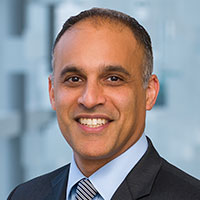- Fellowship - University of California, San Francisco Medical Center (2009-2011), Transplant Surgery
- Residency - Harvard Medical School/Massachusetts General Hospital (2004-2009), Surgery
- Medical School - Yale School of Medicine (2000-2004)

Parsia Vagefi, M.D.
- Ernest Poulos, M.D., Distinguished Chair in Surgery
- Surgery - Surgical Transplantation
- Kidney Transplant Surgery
- Kidney & Liver Transplantation Surgery
Biography
Parsia Vagefi, M.D., Professor and Executive Vice Chair of Strategy and Finance in UT Southwestern Medical Center’s Department of Surgery, serves as the Chief of the Division of Surgical Transplantation and specializes in liver transplant and hepatobiliary surgery.
Dr. Vagefi holds an undergraduate degree from Johns Hopkins University. He earned his medical degree at Yale School of Medicine and completed a Howard Hughes Medical Institute fellowship at Harvard Medical School. He performed his residency in general surgery at Massachusetts General Hospital and then completed a fellowship in abdominal transplant at the University of California, San Francisco, before returning to Harvard as a staff surgeon with increasingly higher levels of responsibility. He joined the UT Southwestern faculty in January 2018.
Dr. Vagefi is a Fellow of the American College of Surgeons and a member of several other professional organizations, including the Society of University Surgeons, Halsted Society, Society of Clinical Surgeons, and the American Surgical Association.
Meet Dr. Vagefi
Liver Transplant and Hepatobiliary Surgery Specialist in Dallas
Parsia Vagefi, M.D., is a liver transplant and hepatobiliary surgery specialist and Chief of the Division of Surgical Transplantation at UT Southwestern Medical Center. Many of the patients he treats are facing extreme circumstances, such as kidney or liver failure or cancer. But by using today’s most advanced surgical techniques, Dr. Vagefi and his team are often able to see an immediate improvement in many patients, transforming their lives in the course of just a few hours.
“When we do a liver transplant, we can witness the new organ already making bile before we’ve even finished the operation,” Dr. Vagefi says. “Transplant is such an amazing endeavor. And through it, you're really helping people that are very sick. I feel very fortunate to be a part of that process.”
Making a Difference
Dr. Vagefi knew he wanted to be a surgeon early on, because he loved working with his hands and being able to see tangible results from his efforts. In college, he volunteered with Habitat for Humanity and was drawn to the idea of making a difference in people’s lives.
“I was always interested in surgery, and I liked the challenge,” he says. “I liked the ability to help someone immediately, whereas other fields of medicine can take weeks or years to get someone better. Surgery had this immediateness that was very exciting.”
It was during medical school that Dr. Vagefi had an opportunity to follow that passion in a truly leading-edge environment. He took a year off to work in a transplant immunology lab, where the research involved doing kidney transplants between pigs and from pigs to baboons. The goal was to better understand why the body accepts (or doesn’t accept) a transplanted organ, all in an effort to improve transplant outcomes for human patients.
“One of the exciting things about transplant as a field is that it’s always pushing the envelope,” Dr. Vagefi says.
However, Dr. Vagefi says there is still plenty of progress to be made. He points to the approximately 2,500 patients across the country who die every year while waiting for a liver transplant.
“As a transplant community, we are constantly evaluating ourselves and asking the question, ‘How can we do it better, and how can we better serve our patients – not just those who get transplanted but those who are waiting?’” he says. “It's very easy to celebrate the successes of getting someone a transplant, but we also have to focus on those who aren’t getting one.”
A Team Effort
One way to continually improve organ transplant is to work closely with other specialists, which is an approach Dr. Vagefi and the rest of his team at UT Southwestern pride themselves on.
“In our field, you’re bringing together so many different groups of people to the same table – surgeons, hepatologists, nephrologists, pharmacists, infectious disease specialists, interventional radiologists, oncologists, and more,” he explains. “It's a very collaborative, team-based approach, asking and answering these questions of how to do it better. And that's one of the great things about transplant.”
At UT Southwestern, Dr. Vagefi found a transplant team that is just as committed as he is to doing whatever it takes to help the sickest patients.
“This is an amazing group of people – surgeons, nurses, and administrators – across the board, everyone is fully committed to transplant,” he says. “Transplant is a challenging lifestyle for the practitioners. The hours are long, and most often the timing of transplants is unpredictable, so a lot happens in the middle of night. It takes a special group of people who are committed to really make it work. From the moment I visited UT Southwestern, I felt that presence and knew that everyone was on the same page.”
Education & Training
Clinical Focus
- Kidney Transplant Surgery
- Kidney & Liver Transplantation Surgery
- Liver Transplant Surgery
Q&A by Dr. Vagefi
Articles by Dr. Vagefi
Results: 1 Locations
University Hospital Kidney and Liver Transplant Clinic
at Professional Office Building 2 5939 Harry Hines Blvd., 7th Floor, Suite 700Dallas, Texas 75390 214-645-1919 Directions to University Hospital Kidney and Liver Transplant Clinic Parking Info for University Hospital Kidney and Liver Transplant Clinic





